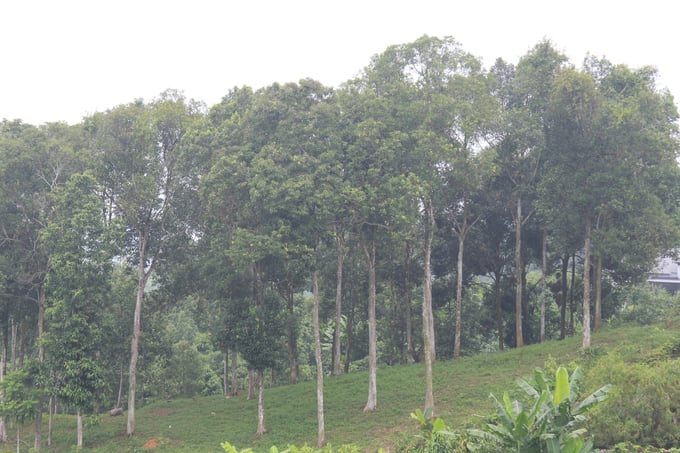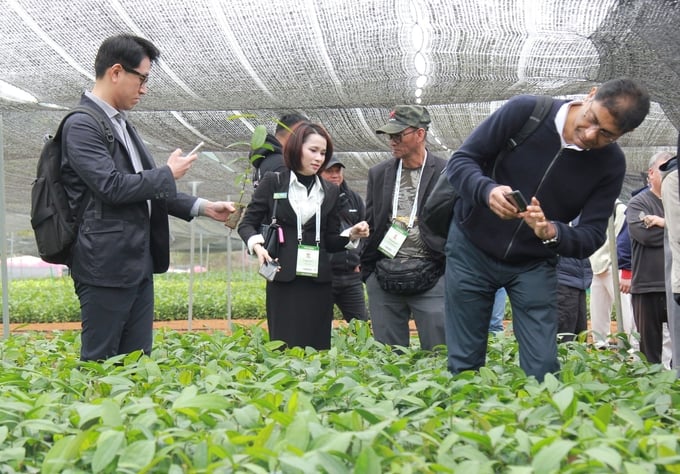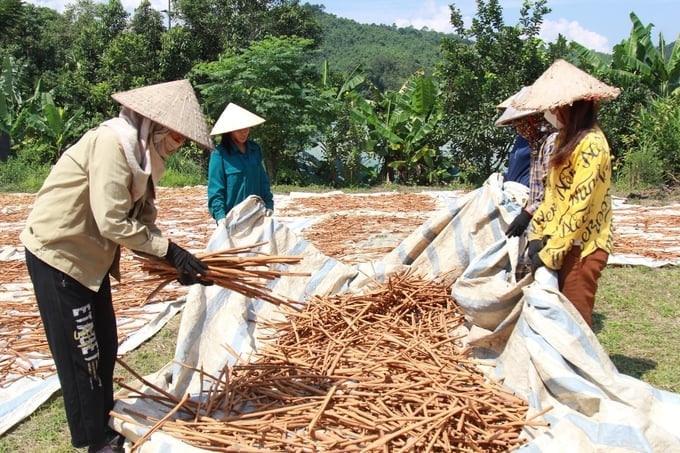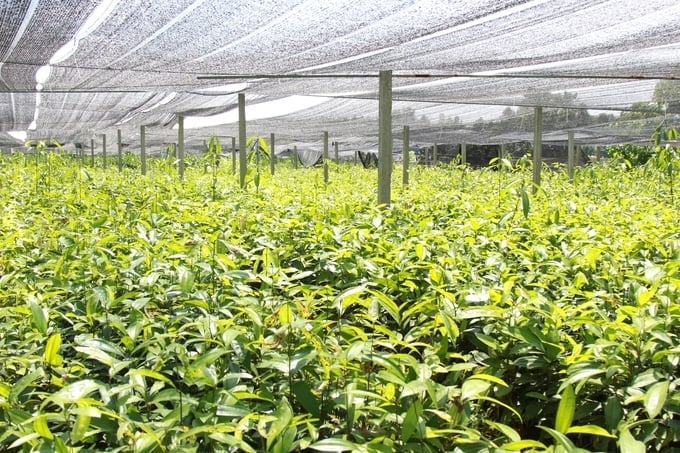June 15, 2025 | 11:39 GMT +7
June 15, 2025 | 11:39 GMT +7
Hotline: 0913.378.918
June 15, 2025 | 11:39 GMT +7
Hotline: 0913.378.918
Due to its multifunctionality, Yen Bai province has designated cinnamon as a key crop within the local strategy for forest economics development. Every part of the cinnamon tree can be utilized to provide stable income for local farmers. Namely, the bark of the cinnamon tree can be utilized in the spice and pharmaceutical industries; small branches and leaves can be used in the essential oil distillation process; the wood from the trunk can be used in the production of furniture and handicrafts.
A cinnamon production cycle can last up to twenty years, depending on production density. Cinnamon forests can be selectively pruned, and continuously harvested for branches and leaves from the fourth year onwards. Cinnamon trees contribute to increasing forest cover and protecting the ecological environment.

Yen Bai province currently houses the largest cinnamon raw material area nationwide. Photo: Thanh Tien.
Cinnamon plays a significant role in alleviating poverty and hunger for the local residents in highland and ethnic minority areas. Furthermore, it contributes significantly to the local budget and economic development. Consequently, after growing at an immense pace over the last thirty years, Yen Bai province currently boasts the largest cinnamon production area nationwide.
To date, the total cinnamon production area in Yen Bai is estimated at approximately 90,000 hectares, which represents 50% of Vietnam's total cinnamon production area. Cinnamon production is primarily concentrated in Van Yen district with 57,000 hectares, Tran Yen district with 20,000 hectares, Van Chan district with 9,500 hectares, Luc Yen district with 6,000 hectares, and Yen Binh district with 2,000 hectares.
Yen Bai province produced over 18,000 tons of dried cinnamon bark in 2023. Additionally, the province harvested over 200,000 cubic meters of cinnamon wood and 86,000 tons of cinnamon branches and leaves. Cinnamon tree products serve as raw materials for the processing of food, medicine, essential oils, utensils, and handicrafts that are consumed domestically and internationally.
According to Mr. Kieu Tu Giang, Director of the Yen Bai province's Sub-Department of Forest Protection, local farmers employed a habitual approach to cinnamon production without applying techniques such as digging holes, fertilizing, leaf pruning, etc. Furthermore, farmers relied on personal experience to select seed, which leads to the degeneration of the cinnamon seed. The uncontrolled and unregulated use of fertilizers and pesticides resulted in low cinnamon productivity and high levels of pesticide residue in cinnamon products. As a result, local cinnamon farmers face considerable challenge in meeting market requirements. Subsequently, the production of cinnamon became unprofitable for famers as its yield grew inconsistent.

Yen Bai province has implemented various policies to support the local community in developing raw material areas for organic cinnamon production. Photo: Thanh Tien.
With the goal of promoting sustainable cinnamon development and enhancing cinnamon product value, Yen Bai province aims to establish 90,000 hectares of stable cinnamon production area by 2025, which includes 35,000 hectares of intensive production area and 20,000 hectares of certified organic production area.
Additionally, the province will focus on developing concentrated and intensive cinnamon production areas in compliance with regulations on food safety, disease control, and environmental protection. Subsequently, these areas will be developed in association with cinnamon product consumption.
Notably, Yen Bai Provincial People's Council developed Resolution No. 69 to regulate support policies for the development of agriculture, forestry, and aquaculture from 2021 to 2025. Accordingly, the province will focus on supporting the development of organic cinnamon production in association with the establishment of a value chain from the production stage (managed by cinnamon farmers) to the processing and product consumption stage (managed by businesses, cooperatives and cooperative alliances). Additionally, the value chain will be monitored and regulated by the local government. Participants of the organic cinnamon production value chain who developed at least 1,000 hectares of raw material area and received approval from competent authorities will benefit from the support policies.
Namely, participants will receive full financial support for the assessment and identification of raw material areas; the development of plans and business strategies, market development, cooperative mechanisms between processing facilities, cinnamon farmers, and local governments; the completion of certification registration documents. The maximum support amount for these activities is set at 100 million Vietnamese dong per project. On the other hand, participants will receive full financial support for the assessment and certification of organic production area; the maximum support amount is set at 0.5 million Vietnamese dong per hectare of production area.
Additionally, participants will receive full financial support for the designing of packaging; purchase of labels and packaging materials; certification of OCOP product; participation in trade promotion activities domestically and internationally. The maximum support amount for these activities is set at 200 million Vietnamese dong per project.

To date, Yen Bai province houses over 14,500 hectares of certified organic cinnamon production area. Photo: Thanh Tien.
As a result of various support policies, the certified organic cinnamon production area in Yen Bai province reached over 14,500 hectares, including 11,000 hectares in Van Yen district, 3,500 hectares in Tran Yen district, and 350 hectares in Van Chan district. These certified areas are managed by businesses in collaboration with local residents.
According to Mr. Pham Trung Kien, Vice Chairman of Van Yen district People's Committee, the development of organic cinnamon has addressed the challenges in traditional cinnamon production. The use of high-quality seedlings and the effective implementation of technical procedures in planting, fertilizing, caring, pruning, etc., help improve productivity and the quality of cinnamon products.
The application of biological measures in pest control has helped reduce the level of chemical pesticide residue in cinnamon products, thereby contributing to the protection of the ecological environment. An emerging global trend, sustainable organic production contributes to expanding Vietnam's consumption market, exploring new potential markets, and stabilizing product output.
In Yen Bai province, cinnamon trees are a significant source of annual revenue and stable employment for a sizable labor force. However, the uncontrolled growth and lack of planning that accompany the planting of cinnamon trees is negatively affecting the development and quality of cinnamon in the province.
On the other hand, cinnamon farmers have the tendency to overharvest and exploit resources irresponsibly. Many cinnamon producing households have engaged in extensive harvesting; notably, some households have cleared out young and underdeveloped cinnamon areas. Unplanned tree felling and pruning activities have negatively impacted the growth and development of cinnamon trees and the quality of cinnamon products.

The establishment of high-quality cinnamon seedling farms and forests is a priority investment for Yen Bai province. Photo: Thanh Tien.
Mr. Nguyen Thai Binh, Deputy Director of the Yen Bai province's Department of Agriculture and Rural Development, emphasized that by closely monitoring the sources of cinnamon seeds, Yen Bai will promote the sustainable development of cinnamon production in order to improve product quality. Namely, the province will utilize cinnamon seedlings with verified origin to enhance forest productivity and quality. The province will also implement activities to conserve and maintain native cinnamon seed sources, and recognize seed sources for seed forests and dominant trees. Additionally, Yen Bai will establish cinnamon seedling nurseries to provide high-quality seed materials for mass production.
Furthermore, there is an active effort to integrate cinnamon production into the value chain, which encompasses cultivation, harvesting, processing, and product consumption. The province will focus on deep processing and refining activities to create high-value products. The application of modern processing technology and quality management procedures to improve product quality and value will be a priority in the sustainable planning of processing facilities for cinnamon bark, cinnamon wood, and cinnamon oil. The expansion of cinnamon development models towards intensive and organic production with the goal of obtaining sustainable forest management certification will also be encouraged.
In 2023, Yen Bai province recognized 2 cinnamon seed forests in Van Yen district with a total area of nearly 13 hectares; recognized 35 dominant cinnamon trees in Van Yen and Tran Yen districts. The province will continue to encourage local residents and businesses to participate in building and developing native cinnamon seed forests and seedling nurseries to expand the sustainable organic cinnamon material area from 2024 onwards.
Translated by Nguyen Hai Long
![Turning wind and rain into action: [4] Bringing climate bulletins to remote and isolated areas](https://t.ex-cdn.com/nongnghiepmoitruong.vn/608w/files/linhnhp/2025/06/14/1152-z6704423696987_15fd32ffc26d590d204d520c9dac6786-nongnghiep-151141.jpg)
(VAN) The Vietnam Agriculture and Nature Newspaper interviewed Mr. Vu Thai Truong, Acting Head of Climate Change and Environment at UNDP Vietnam, to gain deeper insight into how climate bulletins are delivered to farmers.

(VAN) In Tien Giang, a high-tech shrimp farm has developed a distinctive energy-saving farming model that has yielded promising results.
![Turning wind and rain into action: [3] 300.000 farmers benefit from agro-climatic bulletins](https://t.ex-cdn.com/nongnghiepmoitruong.vn/608w/files/news/2025/06/12/e5a48259d6a262fc3bb3-nongnghiep-125122.jpg)
(VAN) The agro-climatic bulletin has become a valuable tool for farmers in the Mekong Delta. After more than five years of implementation, the initiative is gradually being expanded nationwide.
![Turning wind and rain into action: [2] Providing forecasts to the people](https://t.ex-cdn.com/nongnghiepmoitruong.vn/608w/files/news/2025/06/12/e5a48259d6a262fc3bb3-nongnghiep-103927.jpg)
(VAN) In addition to improving the quality of hydrometeorological forecasts, putting forecast bulletins into practical use is crucial for production and disaster prevention.

(VAN) Blue carbon is receiving attention for its rapid absorption capacity and vast potential. It represents a promising nature-based solution to respond to climate change.
/2025/06/11/3507-1-161904_583.jpg)
(VAN) Seagrass beds and coral reefs serve as 'cradles' that nurture life in the ocean depths, creating rich aquatic resources in Vietnamese waters.
![Turning wind and rain into action: [1] Forecasting for farmers](https://t.ex-cdn.com/nongnghiepmoitruong.vn/608w/files/news/2025/06/11/e5a48259d6a262fc3bb3-nongnghiep-111919.jpg)
(VAN) Weather is no longer just a matter of fate. Forecasts have now become an essential companion for farmers in every crop season.